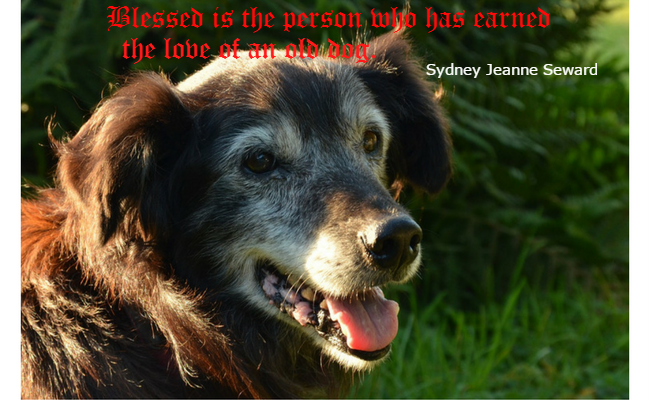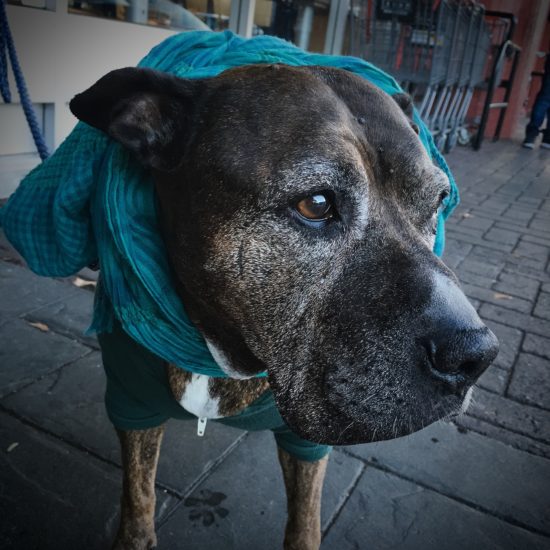
(Photo by MrsBrown at Pixabay under CC0.)
Are you thinking of adding another four-footed member to your family? There are a number of good reasons to seriously consider adding a senior dog to your household.
The month of November has been designated Adopt a Senior Pet Month by the American Society for the Prevention of Cruelty to Animals (ASPCA). The holiday was created to promote adoptions of senior pets, which are among the most difficult pets for shelters to re-home. I can’t find with certainty the first celebration of this holiday, but it has been a yearly event since at least 2004.
What is a senior dog?
Unfortunately, there is no quick and easy answer to this question. A standard response – unfortunately not true – is that one human year is equal to seven dog years. However, dogs age faster than people in their early years and large dogs age faster than smaller breeds. The age designated as “senior” varies, then, by breed and by weight of the dog.
According to Dr. Heidi Lobprise, DVM, of the International Veterinary Senior Care Society in an interview by Pet MD (Defining Senior Age in Dogs), in most cases dogs can be considered senior sometime between 5 and 10 years of age. She also differentiates between “senior” pets, who are “likely still healthy or just beginning to experience signs of aging” and geriatric pets who are “at the older end of the aging spectrum and often experience more health-related issues.”
An article by Kristen Seymour on Vet Street describes a survey (Aging Pets: Senior, Geriatric and What It All Means to Experts and Readers) that Vet Street did involving 213 veterinary professionals and 1,896 nonprofessional readers. Survey respondents were asked to provide the ages that they considered pets to be senior and geriatric. The veterinary professionals’ ages for both categories were lower than nonprofessionals’ responses. Professionals considered giant breeds to be senior at about age 5, while other size dogs hit senior at about 7 years. They considered giant breeds to be geriatric around 7 years, large breeds near 9 years, and small to medium around 11 years. Like the nonprofessional readers that responded to the survey, I would have also guessed several years higher in each category.
Why should I adopt a senior dog?
Saving a life.
Senior pets are the most difficult for shelters to place. While adopting a dog of any age from a shelter or rescue will make you feel good about having helped with the problem of homeless pets, adopting a senior will make you feel that you have really rescued one and given him a well-deserved chance for a happy second half of life.
In a survey conducted in 2014 by Pet Finder (ASPCA’s Adopt a Senior Pet Month), senior pets were harder to adopt even than special needs pets, with respondents claiming 28% of their less adoptable pets were seniors. They are generally quieter and often overlooked for the more active younger dogs and puppies. Seniors also have higher euthanasia rates and tend to spend more time at shelters waiting to be placed. They can often live the rest of their lives in the shelter waiting for a new home.
Lysa Boston, Shelter Manager of the Joplin Humane Society, in a 2013 interview with KOAM TV about Adopt a Senior Dog Month says:
“You are truly saving a life that someone else turned away from. Senior pets have so much love and compassion still to share, and they make the most amazing companions. “
Life has value at all ages.
The Senior Dogs Project voices this thought-provoking statement:
“By adopting an older dog, we can make a statement about compassion and the value of all life at all ages.”

(Photo by PublicDomainPictures on Pixabay under CC0.)
Adapt faster to their new home.
Senior dogs seem to settle in and bond with their new families faster than a younger dog. It’s almost as if they know that you have rescued them from their situation and are grateful for it. They seem to adapt faster and find their place more quickly with both human and animal family members than younger animals. Of course, it’s possible that with age comes more wisdom and a little less attention deficit disorder, but I prefer to look at it as gratitude for a second chance.
Likely less damage to your home.
If they have survived to their senior years, they are far less likely to do damage to your home than a younger dog or puppy. They are likely already housebroken – or could be reminded of in-the-house behavior very quickly after their stay in the shelter. Chewing on furniture, molding strips, etc., is far less likely to be an issue than with a younger dog.
Likely less training required.
Since seniors are also likely to have had some training (leash training, commands, etc.), they will be far easier to finish training (if they even need more training) than their younger counterparts. The myth that “you can’t teach an old dog new tricks” is just that – an untrue myth. They are easier to train since they try harder to please and focus harder than younger dogs. If they do need some extra training, a class is a good excuse for some one-on-one time out of the house for even more bonding!

(Photo by maroonedonisland on Pixabay under CC0.)
Youth is for the young.
Seniors are quieter, less excitable and have a lower activity level than a younger dog. If you want a walking partner, you are walking – not running. Do you want to cuddle or just sit quietly and read a book or watch a movie? Try doing that with a puppy. If you lead a quiet life yourself, they fit in very easily. They are not an intrusion – just awesome company.
Less undivided attention needed.
Because seniors don’t need quite so much attention and time as far as training and monitoring to see that they stay out of mischief, they can fit perfectly into a busy younger family. I’m not saying that they don’t need attention and love – of course they do – but they’re not adding a lot more mandatory time demands to your already overloaded daily schedule.
What you see is what you get.
Finally, seniors are largely “what you see is what you get.” They are grown. You don’t have to guess what color or what size they will be – they are what you see. You don’t have to guess as to their temperament – it has already developed and is what it is. It might take a little time for your senior to transition again from shelter to your home, but largely what you see is what you get. No big surprises. Since a pet should be a lifetime proposition – not just until you get tired of him – knowing what you have to work with is be very reassuring.
Where to find a senior dog to adopt.
The first two places I would always recommend to start your search for a new dog of any age are Pet Finder and Adopt-a-Pet.
Please see Start the Search for Your Next Family Member – Adopt. It should give you a good start for your search.
Seniors for Seniors.
Many shelters run a “senior for seniors” event during the month of November, providing senior pets at a discounted price for senior citizens or older adults. Pets give otherwise relatively sedentary and possibly isolated people a reason to get out of bed in the morning. They provide companionship for the older adult – as well as providing a warm friendly home for the senior pet. This is awesome on so many levels! It’s a match made in heaven for the senior adult, although these dogs can be terrific additions to a younger, more active family also.
Final Thoughts.
The Senior Dogs Project notes:
“A dog can bring out the best in people; a dog unwanted because of age reaches to the very depths of human kindness and compassion.”
If you can open your heart and your home to a new family member, a senior dog can be the perfect addition and a wonderful companion. There are many amazing senior dogs of all breeds who can’t wait to meet you – and would love to be settled in with you before the holidays.
Please leave a comment below or send a picture of your new senior family member. I would love to know how everything worked out and your thoughts on the adoption.
Have you adopted a senior dog in the past? Please feel free to let me know your thoughts.
A special “thank you” to the above-mentioned photographers for making their work available for use.
My sources for this article are listed below for further reading.
Sources/Additional Reading
http://www.petmd.com/dog/care/evr_dg_defining_senior_age_in_dogs
http://www.goodnewsforpets.com/aspcas-adopt-senior-pet-month/
http://www.srdogs.com/Pages/adopt.html
https://justsimplydogs.com/2016/11/start-search-for-next-family-member-adopt//
Like this? Share it!
